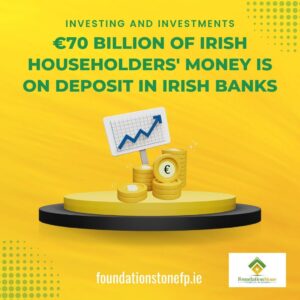Bad food and less exercise?
Most of us know that cutting out bad food and doing more exercise will result in greater “Physical Wellbeing.” We will however avidly watch “Operation Transformation”, read a thousand self-help blogs, and possibly even pay for or subscribe to a fitness course, diet, or magic food substitute, especially at this time of year. By the end of February, we will have discovered that the sponsor or promoter of the fitness course is only telling us what we already know. The fad diet is unsustainable, and the magic potion is undrinkable. In 95% of cases, we will stop attending, eat a doughnut and just give up.
Is there a magic bullet?
In seeking “Financial Wellbeing” we behave in a very similar way. Almost everyone knows that spending less than you earn is helpful, investing for the long-term works, and spreading your risk helps. Yet we will still seek out the magic bullet solution. Buy a hot mutual fund, think that all that glitters is gold, and perhaps a little crypto in your life will lead you to a state of “Financial Wellbeing.” (99.9% of the financial advice when examined closely will be about buying a product.) Like the new
diet and exercise regime, we often stop doing what we should. The problem however is that chasing a fad or not having a proper financial plan can either result in painful financial loss or long-term financial hardship.
Me, Me, Me.
The thing is the biggest barrier to your “Physical or Financial Wellbeing” 99 times out of 100, is you. Yes, you blame the instructor, the JuJu Juice, or the taste of beans. In financial terms, you blame the advisor, the fund manager, or some other external factor that you could not have thought of. These are all self-deceptive behaviors. The difficulty is not finding a solution or advice, these are out there in millions of blogs, adverts, and sales patters. The real issue is that you believe you are different and
know better.
Where to begin.
It is my view is that “Financial Wellbeing” needs to start with your relationship with money. Unless you live completely off the grid, hunt for food, generate your electricity, and grow your fuel, money is used every day of our lives. We either work for it, spend it, or save it. The issue at hand is does it control us or do we control it? Buy a new car every 3 years? In this context how much conscious thought do we give to what we want from our money? I hear it all the time, life just happens. We end up with more debt than is good for us and things that do not necessarily make our lives better. Buying a new car every 3 years, living in a huge house that needs to be heated are just a couple of examples. Spending on Credit Cards and using overdrafts indiscriminately to buy frivolous things. By the way, people with lots of money are just as prone to this behavior as people of more modest means.
Not all advice is equal.
From the beginning of this piece, you might think I was saying do not take advice. I am most certainly not saying that. To counteract our self-deceiving tendencies I strongly suggest you do seek advice. However, if the advice starts with how much do you have to invest or what sort of risk do you want to take, run away as fast as you can. If on the other hand, the advisor starts with “what is the money for?” stay and listen. Even better if the advisor spends time understanding and learning about your relationship with money. If they ask what you think your best life looks like or if money was not a barrier what would you like to do? Then you have the basis for making some good financial decisions. Do not be rushed into a financial product purchase.
How to make it work.
Peace of mind does not come from having a great investment portfolio or having sufficient life cover. Peace of mind comes from a better relationship with money and being confident you are using it with purpose. It is the same with a healthy lifestyle. If you decide to eat better and do more exercise because you want to cycle from Mizzen to Malin Head raising money for charity or be an active sports coach to your children or grandchildren then the lifestyle change has a purpose, and you are more likely to stick with it. The same applies to money. Give it a purpose. Remember money is not the objective living your best life with the money you have is.





